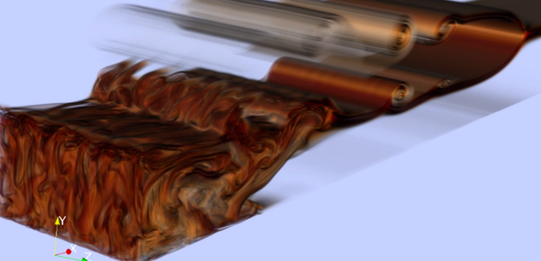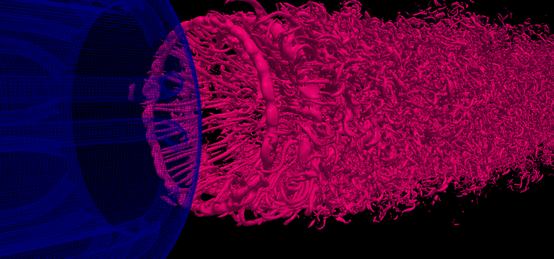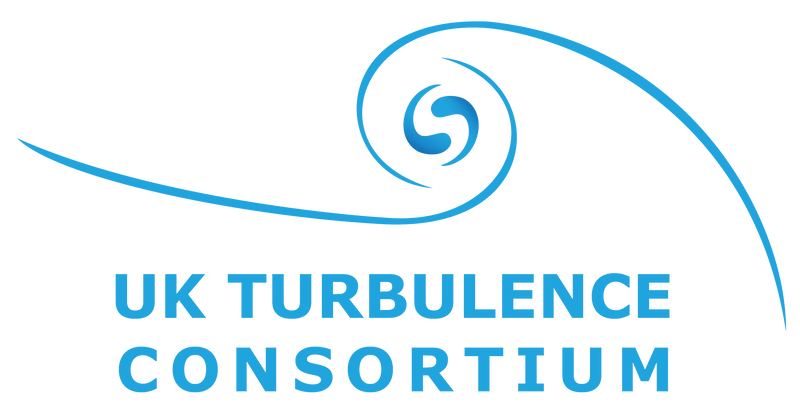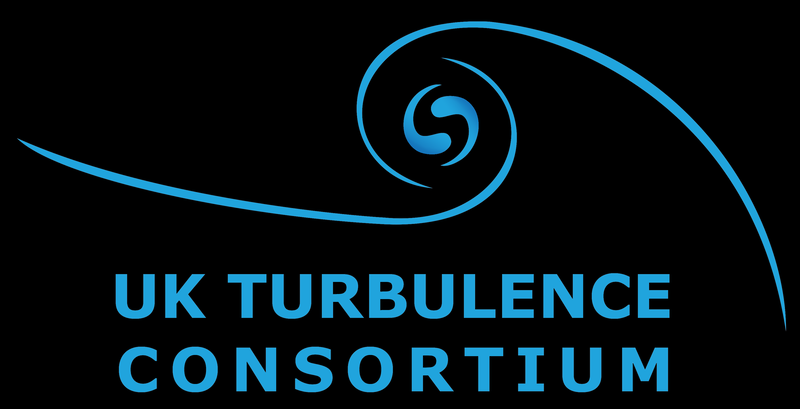The UK Turbulence Consortium
Understanding, predicting and controlling turbulent flows is of central importance and a limiting factor to a vast range of industries: naval, aeronautical, automotive, power generation, process, pharmaceutical, meteorological and environmental. For example, energy-efficient fluid mixing is a major limiting factor in the chemical industry which is the second largest industrial consumer of energy worldwide, but also in the pharmaceutical and process industries. How can one mix best with as little power loss as possible? The cost of pumping oil and gas through pipelines is directly proportional to the frictional losses due to turbulence. Polymer additives can modify the turbulence in these pipelines to reduce frictional losses and speed up the flow by one or two orders of magnitude with the same power input. How can one maximise this effect which remains poorly understood? Moving vehicles often generate noise, and in the case of airplanes, it can have a severe detrimental impact close to airports. What kind of airbrake could generate enough drag with as little aeroacoustic losses as possible? Worldwide ocean shipping consumes about 2.1 billion barrels of oil per year while the airline industry uses 1.5 billion barrels per year. How can turbulent boundary layers be controlled to significantly reduce friction drag which will simultaneously reduce costs and emissions? Simulating and understanding turbulent flows to answer the previous questions is one of the most challenging problems in science. Many of the environmental and energy-related issues we face today cannot possibly be tackled without a better understanding of turbulence. The overarching objective of the UK Turbulence Consortium (UKTC) is to facilitate world-class turbulence research using national High-End Computing (HEC) resources. This involves performing numerical experiments with turbulence-resolving computational approaches. Such simulations are ab initio calculations based on first principles and produce data to answer basic questions regarding the physics and modelling of turbulent flows found across a range of engineering, physiological and geophysical applications. The consortium serves as a forum to communicate research and HEC expertise within the UK turbulence community, and to help UK science remain internationally leading in this aspect of HEC-based research.
Firstly funded in 1995, the UKTC has been through five highly successful iterations, with significant growth, from 5 original members to nearly 70 members over nearly 25 UK institutions for the present bid (36 members in the previous bid). In the last 22 years, the UKTC has (i) demonstrated its ability to convert access to national High-End Computing (HEC) resources into internationally leading research, (ii) established its international competitiveness, (iii) helped its members to leverage and secure multi-million £ grants from governmental funding bodies and industries, (iv) allowed the discovery of new fluid flow phenomena which have led to new ways of improving beneficial effects and reducing negative effects of turbulent flows and (v) facilitated the design of more sophisticated turbulence models redefining industry standards.
Please contact Sylvain Laizet (s.laizet @ imperial.ac.uk) if you are interested in joining the consortium.
Firstly funded in 1995, the UKTC has been through five highly successful iterations, with significant growth, from 5 original members to nearly 70 members over nearly 25 UK institutions for the present bid (36 members in the previous bid). In the last 22 years, the UKTC has (i) demonstrated its ability to convert access to national High-End Computing (HEC) resources into internationally leading research, (ii) established its international competitiveness, (iii) helped its members to leverage and secure multi-million £ grants from governmental funding bodies and industries, (iv) allowed the discovery of new fluid flow phenomena which have led to new ways of improving beneficial effects and reducing negative effects of turbulent flows and (v) facilitated the design of more sophisticated turbulence models redefining industry standards.
Please contact Sylvain Laizet (s.laizet @ imperial.ac.uk) if you are interested in joining the consortium.
Imperial College London |
University of Bristol |
University of Glasgow |
University of Southampton |
Maarten van Reeuwijk |
Beckett Zhou |
Angela Busse |
Zhengtong Xie |
Sylvain Laizet |
Yufen Yao |
University of Birmingham |
Neil Sandham |
Yung Xu |
Queen Mary London |
Zhong Nan Wang |
Zhiwei Hu |
Francesco Montomoli |
Xi Jiang |
Bruno Fraga |
Ralf Deiterding |
George Papadakis |
Eldad Avital |
University of Manchester |
Jae-Wook Kim |
George Rigas |
Nikos Bempedelis |
Alistair Revell |
Temistocle Grenga |
Spencer Sherwin |
City Universtity |
Pablo Ouro |
|
Peter Vincent |
Mohammad Omidyeganeh |
Alex Skillen |
University of Hertfordshire |
Pavlos Aleiferis |
Juan Guzmán-Iñigo |
Jack King |
Hongwei Wu |
Yongyun Hwang |
Alfredo Pinelli |
Daresbury Lab |
Cardiff University |
Luca Magri |
University of Cambridge |
Charles Moulinec |
Elisabetta De Angelis |
Aimee Morgans |
Andy Wheeler |
Stefano Rolfo |
Zhihua Xie |
Chris Cantwell |
Paul tucker |
Jian Fang |
University of Newcastle |
Bill Jones |
University of Nottingham |
David Emerson |
Nilanjan Chakraborty |
Loughborough University |
Christopher Ellis |
University College London |
Umair Ahmed |
Gary Page |
Amirreza Rouhi |
Kai Luo |
Mohsen Lahooti |
Jialin Su |
University of Surrey |
University of Sheffield |
University of Liverpool |
Hao Xia |
Olaf Marxen |
Elena Marensi |
Vassilios Theofilis |
University of Oxford |
University of Exeter |
Shuisheng He |
Mehdi Seddighi |
Wouter Mostert |
Beth Wingate |
Pierre Ricco |
King's College London |
University of Salford |
University of Cranfield |
University of Durham |
David Moxey |
Cung Ngyuen |
Tamás István Józsa |
Laura Currie |
Richard Jefferson-Loveday |
University of Edinburgh |
Martin Stoke |
University of Exeter |
University of Leicester |
Alexander Morozov |
Takis Tsoutsanis |
Joanne Mason |
Thomas Jelly |
Antonio Attili |
Brunel University London |
Beth Wingate |
Nottingham Trent University |
Moritz Linkmann |
James Tyacke |
University of Warwick |
Amirreza Rouhi |
University of Leeds |
Jun Xia |
Gihan Mudalige |
Sheffield Hallam University |
Steve Tobias |
Swansea University |
Yongmann Chung |
Adriano Cerminara |
Queen's University Belfast |
Zhaoxin Ren |
Harish Viswanathan |
|
Ben Thornber |
The main objectives of the consortium are:
(1) Facilitate world-class turbulence research using national High-End Computing (HEC) resources. This involves performing numerical experiments with turbulence-resolving computational approaches. Such simulations are ab-initio calculations based on first principles and produce data to answer basic questions regarding the physics and modelling of turbulent flows found across a range of engineering, physiological and geophysical applications.
(2) Provide the central core of a needed critical mass activity considering the big challenges posed by turbulence.
(3) Serve as a forum to communicate research and HEC expertise within the UK turbulence community, and to help UK science remain internationally leading in this aspect of HEC-based research.
(4) Offer to our members networking, mentoring and jobs opportunities, travel grants for code development and engagement with industries, support towards Tier 0 applications, access and core support to a suite of complementary flow solvers.
(5) Develop software that will enable new research areas to be tackled with HEC and will help production codes used in the UK to capitalize on future HEC architectures, giving UK researchers the opportunity to be the first to explore new physics.
The consortium is split into seven carefully designed Work Packages (WPs): four core work packages, WP1 (Boundary Layers, Pipes and Channels), WP2 (Jets, Wakes and Shear Layers), WP3 (Heat Transfer and Mixing) and WP4 (Aeroacoustics and High-Speed Flows) and 3 transverse work packages, WPA (world-class and world-leading Grand Challenges), WPB (Multicore/Manycore Algorithms) and WPC (Towards Industrial Cases).
(1) Facilitate world-class turbulence research using national High-End Computing (HEC) resources. This involves performing numerical experiments with turbulence-resolving computational approaches. Such simulations are ab-initio calculations based on first principles and produce data to answer basic questions regarding the physics and modelling of turbulent flows found across a range of engineering, physiological and geophysical applications.
(2) Provide the central core of a needed critical mass activity considering the big challenges posed by turbulence.
(3) Serve as a forum to communicate research and HEC expertise within the UK turbulence community, and to help UK science remain internationally leading in this aspect of HEC-based research.
(4) Offer to our members networking, mentoring and jobs opportunities, travel grants for code development and engagement with industries, support towards Tier 0 applications, access and core support to a suite of complementary flow solvers.
(5) Develop software that will enable new research areas to be tackled with HEC and will help production codes used in the UK to capitalize on future HEC architectures, giving UK researchers the opportunity to be the first to explore new physics.
The consortium is split into seven carefully designed Work Packages (WPs): four core work packages, WP1 (Boundary Layers, Pipes and Channels), WP2 (Jets, Wakes and Shear Layers), WP3 (Heat Transfer and Mixing) and WP4 (Aeroacoustics and High-Speed Flows) and 3 transverse work packages, WPA (world-class and world-leading Grand Challenges), WPB (Multicore/Manycore Algorithms) and WPC (Towards Industrial Cases).




